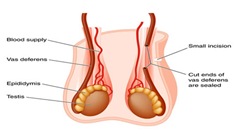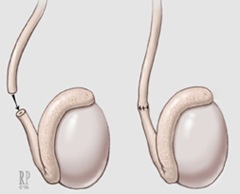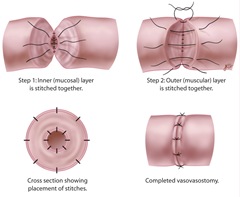Vasectomy reversal, whether you require a vasovasostomy or vasoepididymostomy, is a significant procedure and one that requires a careful decision. If you have had a vasectomy and now wish to restore your fertility, you may be considering a vasectomy reversal. All patients who are considering this option should be aware of the potential for successful reversal, and should also be aware of the factors that can influence the success or failure of this operation.
Skill and Expertise
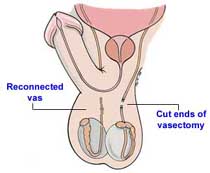 Some factors that influence the rate of success, measured by conception after the vasectomy reversal procedure, include the skill of the surgeon. Because it is impossible to know prior to surgery whether the patient will require the simpler vasovasostomy, in which the vas deferens is reconnected, or a vasoepididymostomy, in which one end of the vas deferens is directly connected to the epididymis, the surgeon you choose should have experience in both procedures. One study showed that almost half of all men who had an unsuccessful vasovasostomy had an obstruction that should have been bypassed with a vasoepididymostomy procedure.
Some factors that influence the rate of success, measured by conception after the vasectomy reversal procedure, include the skill of the surgeon. Because it is impossible to know prior to surgery whether the patient will require the simpler vasovasostomy, in which the vas deferens is reconnected, or a vasoepididymostomy, in which one end of the vas deferens is directly connected to the epididymis, the surgeon you choose should have experience in both procedures. One study showed that almost half of all men who had an unsuccessful vasovasostomy had an obstruction that should have been bypassed with a vasoepididymostomy procedure.
Length of Time Since Vasectomy
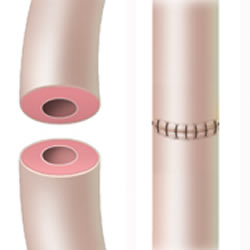 In the past, before the development of microsurgical techniques for vasectomy, the length of time between a vasectomy and reversal of the vasectomy had a significant effect on the success or failure of the reversal procedure. Current studies show that the success rates for vasectomy reversals within fifteen years now range from 82 percent to 89 percent, although the rate of pregnancy dropped to 44 percent after fifteen years.
In the past, before the development of microsurgical techniques for vasectomy, the length of time between a vasectomy and reversal of the vasectomy had a significant effect on the success or failure of the reversal procedure. Current studies show that the success rates for vasectomy reversals within fifteen years now range from 82 percent to 89 percent, although the rate of pregnancy dropped to 44 percent after fifteen years.
Other Surgeries
Other surgery in the groin area, including earlier attempts to reverse a vasectomy or hernia repair, can reduce by success rate of a vasectomy reversal by obstruction in the vas deferens, frequently the result of scar tissue from the previous surgery.
Partner Factors
Conception is more likely to occur after a vasectomy reversal if the female partner is under the age of 40. For women under the age of 40, the rate of pregnancy is 56 percent, compared with 14 percent for women over the age of 40. Another factor in favor of a successful vasectomy reversal is a previous conception between the couple, most likely because they have shown no other fertility problems,
Vasectomies are meant to be a permanent procedure, although reversals are now frequently successful as a result of microsurgical procedures that allow surgeons to place delicate stitches in the vas deferens, ensuring a good closure and healthy blood supply. Dr. Larish is one of New York’s top vasectomy reversal doctors, and he can advise you of the likelihood of a successful vasectomy reversal, if you have made the decision to attempt this procedure in order to naturally conceive a genetic child. Call 646-862-5500 today for your appointment for a consultation with Dr. Larish, New York’s best vasectomy reversal doctor.

